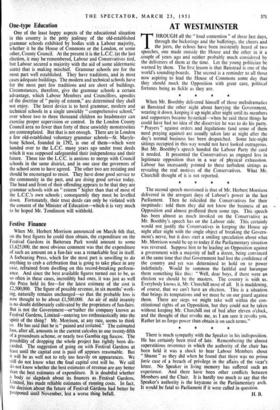AT WESTMINSTER
THROUGH all the " loud contention " of these last days. through the bickerings and the buffetings, the cheers and the jeers, the echoes have been insistently heard of two speeches, one made outside the House and the other in it a .couple of years ago and neither probably much considered by the deliverers of them at the time. Let the young politician be warned by them. The first lesson is that Banstead is one of the world's sounding-boards. The second is a reminder to all those now aspiring to lead the House of Commons some day that they should mock the Opposition with great care, political fortunes being as fickle as they are.
* * * * When Mr. Boothby delivered himself of those melodramatics at Banstead the other night about harrying the Government, wearing it down, keeping it up night after night until its members and supporters became hysterical—when he said these things he could have had no idea of the disservice he was to do his party. " Prayers " against orders and regulations (and some of them need praying against) are usually taken late at night after the day's normal business has been despatched. Some late-night sittings occupied in this way would not have looked outrageous. But Mr. Boothby's speech handed the Labour Party the card it needed. It presented the Conservatives as engaged less in legitimate opposition than in a war of physical exhaustion. Labour has incessantly pointed to these turbulent sittings as revealing the real motives of the Conservatives. What Mr. Churchill thought of it is not reported.
* * * * The second speech mentioned is that of Mr. Herbert Morrison delivered in the arrogant days of Labour's power in the last Parliament. Then he ridiculed the Conservatives for their ineptitude: told them they did not know the business of art Opposition and almost proffered them some tips. This speech has been almost as much invoked on the Conservative as Mr. Boothby's speech has on the Labour side. This certainly would not justify the Conservatives in keeping the House up night after night with the single object of breaking the Govern- ment's nerve, but it does start a smiling speculation about what Mr. Morrison would be up to today if the Parliamentary situation was reversed. Suppose him to be leading an Opposition against a government with a majority of half a dozen, being convinced at the same time that that Government had lost the confidence of the country and yet was determined to hold on to power indefinitely. Would he summon the faithful and harangue them something like this: " Well, dear boys, if there were an election we should be the masters. The country is with us. Everybody knows it, Mr. Churchill most of all. It is maddening, of course, that we can't have an election. This is a situation that brings its temptations and we must be on our guard against them. There are steps we might take well within the con- stitutional rights of an Opposition, but they could not be taken without keeping Mr. Churchill out of bed after eleven o'clock, and the thought of that revolts me, as I am sure it revolts you. Rather let us forgo power than obtain it on such terms."
* * * *
There is much sympathy with the Speaker in his indisposition. He has certainly been tried of late. Remembering the almost superstitious reverence in which the authority of the chair has been held it was a shock to hear Labour Members shout " Shame " as they did when he found that there was no prima jack case of a breach of privilege in the affairs of the vicar's letter. No Speaker in living memory has suffered such an experience. And there have been other conflicts between Members and the Chair. It is hardly too much to say that the Speaker's authority is the keystone in the Parliamentary arch. It would be fatal to Parliament if it were called in question.
H. B.


































 Previous page
Previous page